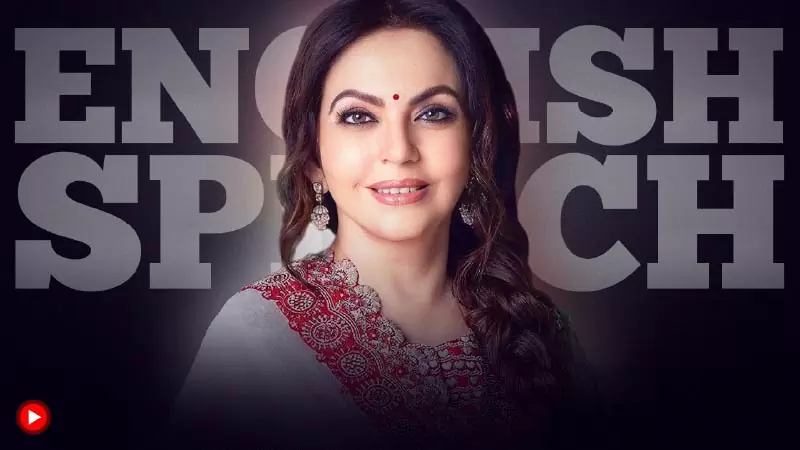Nita Ambani: Women’s empowerment
Learn English with Nita Ambani’s Speech. In this video, Nita Ambani, the founder and chairman of Reliance Foundation, discusses her commitment to supporting women. Nita Mukesh Ambani is a philanthropist from India. Reliance Foundation, Dhirubhai Ambani International School, and Reliance Industries are all founded by her. In addition to being married to Mukesh Ambani, she is the chairman and CEO of Reliance Industries.
English Speeches also makes this content available for download
Download this Speech in PDF and/or MP3 audio file:
Nita Ambani “Quote”
“If you do not build your dream, someone else will hire you to help them build theirs.” Nita Ambani
Nita Ambani | FULL
Download available
for Plus Members
PDF Transcript
Access the full speech in an
easy-to-read PDF format.
Audio Version
Listen and download clear,
high-quality MP3 recordings.
English Lesson
Includes vocabulary
and grammar practice.
Offer ends in:
Offer ended.
TRANSCRIPT:
“In India, women are discriminated against even before they are born. Seven hundred thousand girls are killed in the womb and from there onwards, it’s an uphill struggle for girls. What kind of an India and what kind of a world do we want for ourselves and our children?
Dear Tina, my fellow co-host, the entire Women in the World team, esteemed guests, ladies and gentlemen. Thank you, Tina, for that generous introduction. You are a true icon of women’s empowerment. Your work on how women can bring about transformational change in the world is truly amazing. The Women in the World Summit surely stands out as a lighthouse for millions of women across the world.
It is indeed a privilege to be here today on the same platform as some of the most accomplished women from India and from around the world. To speak after such wonderful women can sometimes be overwhelming, but let me try. Why do I support women and what does it really mean to me? Well, it’s not about me.
It’s about uplifting millions of women in this country. The Reliance Foundation directly impacts the lives of more than 2.2 million women in India through its initiatives in education, health, rural transformation, disaster response and sports. Why do we do this? Is it philanthropy? Is it CSR? Of course, it’s all of these, but much more.
The reason I do this is because I owe a debt. A debt I will go far and deep to repay. All I’m doing is focusing on how soon and how well I can repay this debt. Allow me to explain what I mean. I was born in a family of 11 girls and one boy, a joint family. We were proud to grow up in a house that was free of gender bias.
We were fortunate to be groomed as self-reliant, educated, free-willed and disciplined children. I was interested in dance, so I pursued it and trained in Bharatanatyam. After my graduation, I wanted to teach, so I joined the school and started working as a teacher. When I was getting married, the only precondition I had was that I would continue working even after marriage.
In my story, I had access to education, healthcare and the opportunity to work. Most importantly, I could make my own choices for myself because of an environment, an outlook that encouraged and enabled me. Unfortunately, millions of women don’t have access to basic things like healthcare, water, sanitation and education.
Then there are those who, despite having all these, have no access to employment. And above all, they don’t have the power to make their own choices. In India, women are discriminated against even before they are born. Seven hundred thousand girls are killed in the womb and from there onwards, it’s an uphill struggle for girls.
The opportunity funnel just keeps on getting narrower and narrower for them. Over one million children below the age of five are lost each year, of which three hundred thousand die on the first day of life itself. Worst, a majority of them are girls. As a mother myself, I find this very painful to accept.
Girls are neglected when unwell and not given priority for medical treatment in the family as compared to boys, leading to high infant mortality rates. More than 50 percent of girls fail to enroll to schools. Large number of girls drop out of school at puberty. One of the main reasons being the lack of separate toilets for them.
Nearly 45 percent of girls in India get married before the age of 18. Seventy percent of women are not part of the workforce. All these numbers paint a grim picture. We could have been one of these statistics. This could have been you. It could have been me. Yes, my story could easily have been just like theirs.
But I got lucky. Let me explain how. First, I got lucky through a lottery called births. I was born into a family that gave equal opportunities to girls and boys. Then I won a lottery called education because my family believed in the power of education, especially for girls. And then I met Mukesh. Mukesh encouraged and supported me to pursue my passion, be it education, dance or sports.
Thus, I continued making my own decisions and my choices even after marriage. But my story could have been very different. My story could easily have been just like that of many other women in India. And that is why I owe a debt. We all owe a debt to our sisters who are not as fortunate. We stand at a very important time in history, a time when a crucial difference can be made.
In about a decade, India will have the largest number of women in any country in the world. What kind of an India and what kind of a world do we want for ourselves and our children? A world where women lag behind is not only an unequal world, it’s an unjust world. It’s an unfair world. And we cannot accept a world like that.
Can the world be different from what it looks like today? I believe it’s quite possible. India has a rich tradition of worshipping goddesses. We worship goddess Saraswati for knowledge, goddess Lakshmi for wealth, goddess Durga who destroys all evil. We also have a proud history of women leaders from all walks of life, from Jhansi Ki Rani to Indira Gandhi to Mother Teresa and many others.
These women make us believe in a world with possibilities, a world where women have equal opportunities, a world that is better not just for women but for everyone. According to IMF, if the number of women who joined the workforce in India were to increase the level of men, India’s GDP would grow by 27%.
It is clear, empowered Indian women means a stronger and a better India. My work in India’s poorest villages with women have shown me that we can change the story of Indian women. Take Vajaben. Vajaben is from Netrang, one of the poorest villages in Gujarat. On our first visit to that village, we were struck by the extreme misery.
Farms lay barren, people and children were malnourished. Even a simple meal was beyond their means. Then I met Vajaben. Her father was bedridden and she was a single mother of three young children. For them, life was a real struggle. Yet there was something different about her. In her eyes was a determination to fight her circumstances.
Our foundation wanted to help and our philosophy is to enable people to help themselves. So we helped and assisted Vajaben to set up a nutrition garden. Within three months, the garden was producing more than 200 kilograms of vegetables a month. She was now self-reliant, but she didn’t stop there.
Vajaben motivated other women from her village to set up similar gardens and help them also to earn an income out of it. In a male-dominated community, she rallied other women around her to transform her own village. Soon Vajaben was elected as the president of the Village Farmers Association. Today thanks to Vajaben, there are 44 nutrition gardens in Netrang.
No child goes to bed hungry or is malnourished. Every child goes to an Anganwadi for their well-being and education. I would like to believe there is a Vajaben in every village in India. We need to find them and empower them. They will do the rest. Another example that comes to my mind is Prakash Kaur from Jalandhar.
She comes from the state which has the highest rates of female infanticide in India. Unwanted girls are thrown into garbage dumps, abandoned on railway tracks or river banks. Prakash started picking up these girls and gave them a home and became their mother. Today she runs a unique home where she is a mother to 70 abandoned girls.
Prakash gave these little girls a new life where their own parents wished them death. When I met her at unique home, what really touched my heart was a compassion when she told me, I have not adopted these girls. They are my real daughters. Some of these girls are well-educated teenagers today and one of them is even studying to be a doctor.
True to her name, Prakash is spreading light and hope. These stories tell us that women can make a huge difference. However, we need millions of such stories. To achieve this, we need the right mindset and the right tool set as a society and as a community. When I see people in this room and the commitment to women’s empowerment, I know the future looks bright.
When I look at Prakash Kaur and Vajaben and hundreds of courageous women like them, I know there is hope. Ultimately, supporting women is all about repaying the debt I owe to my sisters. It’s all about ensuring that Vajaben and Prakash Kaur are not exceptions, but they become the norm. Supporting women is neither CSR or philanthropy.
It is our moral responsibility. To support an idea, an idea of a better world. A world with equal opportunities. A world where women inspire the whole of humanity. A world where women can make their own choices and a world where India is at the forefront of that change. Let us together achieve the dream of that beautiful world.
It’s time for action. Together let’s make that dream real. Thank you.“[/read]
Nita Ambani
Follow us on social media:






